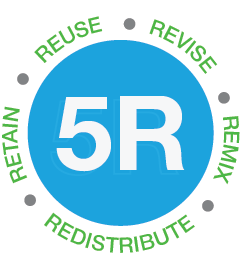Documentation:Open UBC/Education/Toolkits/Learn in the Open/What

Materials created by David Wiley, CC by 4.0
If you have ever used YouTube to learn how to do something or used Khan Academy for studying, you've already been learning in the open. In fact, anytime you google something, you are accessing openly available resources - some of which are useful for learning! So what makes open learning a thing? It has to do with using and contributing to openly licensed resources that can be built on or re-used in your own learning. It is also about connecting with communities and networks beyond UBC, by openly sharing your works in progress and building on the work of others.
Open Educational Resources (OERs) have an open license that allows users to engage in the "5Rs": Retain, Reuse, Revise, Remix, and Redistribute. What does this all mean for you as a student?
Retain
The right to make, own, and control copies of the content:
- Unlike conventional textbooks, OERs are free to access and download for your own use.
- Unlike online textbooks and course materials that require an expensive access code and expire after your course is done, you can keep your own copy of OERs and continue to use it after the term is over.
- By adding an open license to your work, you retain your rights as content creator AND you make it east for others to build on your work.
Reuse
The right to use the content in a wide range of ways (e.g., in a class, in a study group, on a website, in a video):
- Professors can more easily share course content with you.
- You are free to use OERs in class projects and presentations, such as using openly licensed images on research posters or presentation slides, without breaking copyright laws. Of course, you always acknowledge the source.
Revise
The right to adapt, adjust, modify, or alter the content itself (e.g., translate the content into another language):
- Because anyone can edit OERs, you can build on the work of scholars and other students by editing or adding to their openly licensed work - in a revision - the original context and meaning is maintained. Of course, you always acknowledge the original source.
- Professors can create course assignments that have you build on the work of others, allowing you to participate more fully in scholarly discourse. See UBC's Latin American Literature and Linguistics as examples of students collaborating with community experts to author and revise original work.
- Mediawiki (the platform the runs Wikipedia and the UBCWiki) supports this principle of open by allowing for revision, documenting revision history, allowing for version control (you can revert to an original after revision of you want) and associating users with revision history - so you can keep track of who has edited the work. More about wikis for learning.
Remix
The right to combine the original or revised content with other open content to create something new (e.g., incorporate the content into a mashup):
- remixing content allows you to combine resources in different ways which may vary widely from the original context of the work. A common example of mashups include memes, combining open data to create virtual tours, etc.
- Making a Mashup Friendly Library offers some excellent examples of how libraries can support mashups which lead to really useful community resources. It is an open resource created by a graduate student in Library School at UBC.
Redistribute
The right to share copies of the original content, your revisions, or your remixes with others (e.g., give a copy of the content to a friend):
- Rather than turning in assignments to one person, your professor, and never seeing it again, your openly licensed work can be shared with a wider audience of learners who can learn from and build upon it themselves. See examples of open courses and resources at UBC and beyond.
Resources
- Defining the Open in Open Content - David Wiley's
- Evaluating Information Sources - UBC Library
- Evaluating Wikipedia Articles
- 60 second Guide to Evaluating Web Sources - Infographic. Blog post
- Open Licensing for Students - Guide
Philosophy of Open
- Scholarly Publishing and Academic Resources Coalition (SPARC).
- Reclaim Open Learning: http://open.media.mit.edu/